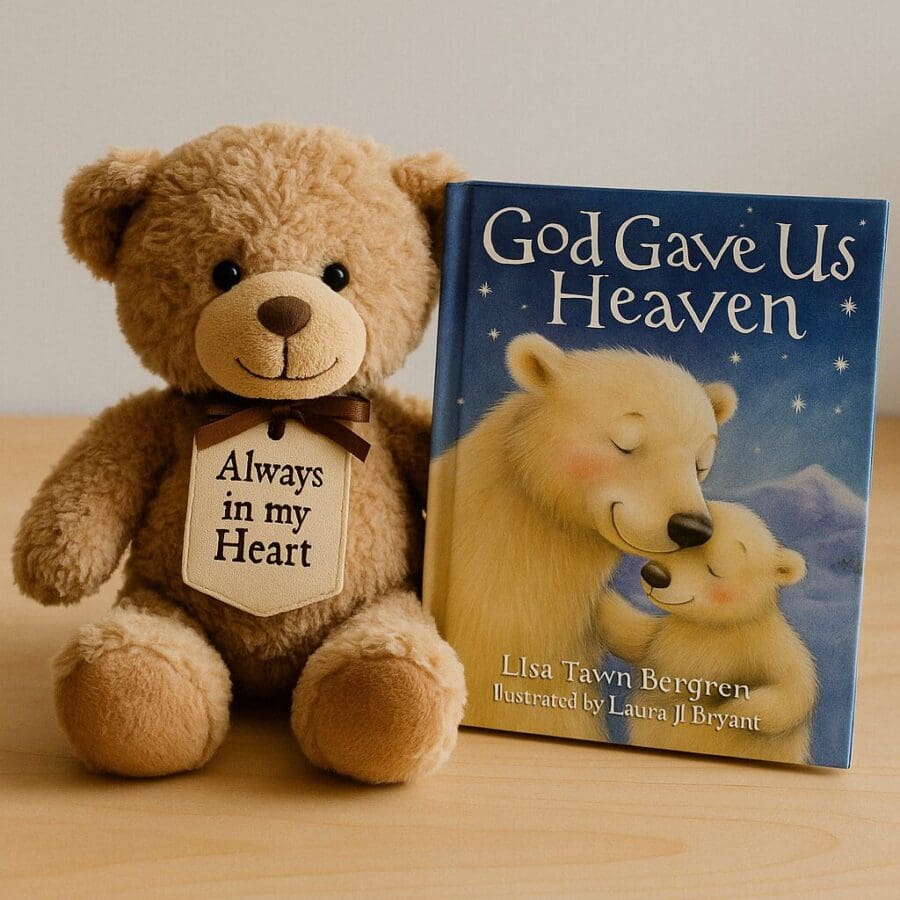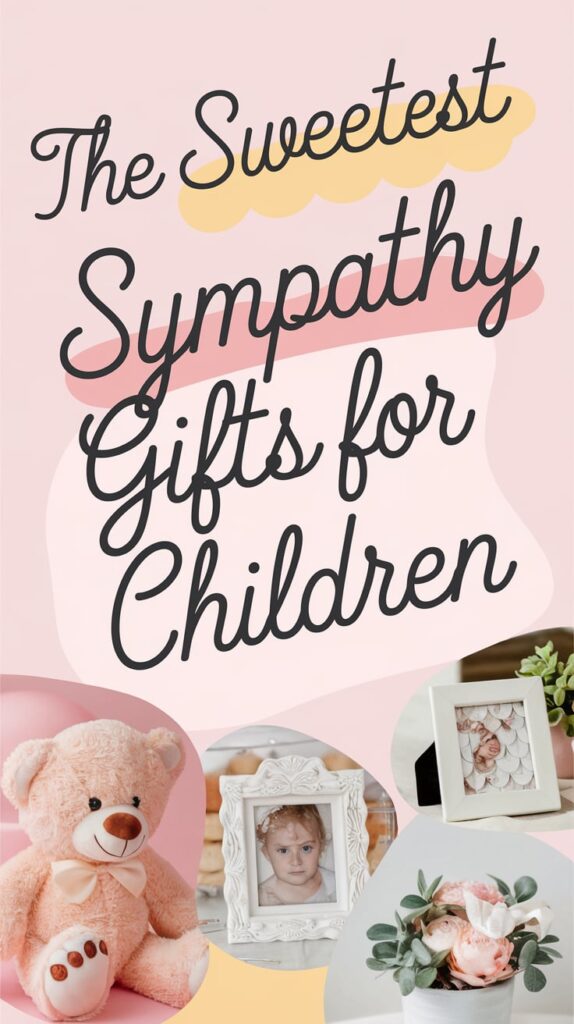Heartfelt Sympathy Gifts for Grieving Children
When a child experiences the loss of a loved one, the adults around them often feel an overwhelming urge to help—but also uncertainty about how to do it well. While no gift can soften the weight of grief, a thoughtful, well-chosen offering can bring emotional comfort, create a sense of safety, and give a child tools to understand what they’re feeling.
This curated list of sympathy gifts for grieving children focuses on items that nurture connection, offer gentle reassurance, and support emotional processing—whether through creativity, sensory comfort, or memory-keeping. These are gifts that respect the depth of a child’s experience while giving them something tangible to hold onto.
Whether you’re a family friend, relative, teacher, neighbor, or community member, these meaningful gestures provide a quiet but powerful way to show care during one of the most vulnerable moments in a child’s life. For additional guidance on supporting children through loss, resources from the Child Mind Institute, the Hospice Foundation of America, and the National Alliance for Children’s Grief are especially helpful.
Heads up: This post may include affiliate links. As an Amazon Associate, I earn from qualifying purchases—at no extra cost to you. Full privacy policy and disclosure here.

1. Stuffed Animal with a Personalized Message
A soft stuffed animal offers more than a momentary distraction. For many children, it becomes a steady companion—something to hold during quiet moments, bedtime, or difficult conversations. Some options come with pockets or pouches for a handwritten note, a photo, or a small keepsake, making the gesture even more meaningful.
View this teddy with memory pouch on Amazon
2. Grief Books for Children
Books written specifically for grieving children provide clear, gentle language to help them understand complex emotions. Many combine storytelling with psychological grounding, offering a safe entry point for conversations. Organizations like the Child Mind Institute frequently recommend books as one of the most effective tools for helping kids process grief.
“The Invisible String” by Patrice Karst — A well-known book that reinforces connection even after loss
“When Someone Very Special Dies” — A workbook that encourages self-expression through drawing and writing
3. Memory Jar or Keepsake Box
A memory box gives children a dedicated place to store photos, letters, trinkets, clothing items, or other meaningful reminders. This simple ritual—collecting and protecting memories—can be grounding and comforting as they navigate grief.
Personalized memory box for kids
4. Sympathy Activity Book or Journal
Journals, activity books, and guided art prompts help children externalize feelings they may not yet have words for. Creative expression—drawing, writing, coloring—can be one of the gentlest ways to navigate grief. Many therapists recommend this approach because it supports both emotional regulation and storytelling.
Grief journal for kids with prompts
Grief coloring book with affirmations

5. Comfort Box or Spa Kit
While often associated with adult self-care, a child-friendly comfort kit—filled with soft socks, calming scents, and tactile items—can help regulate the nervous system during periods of heightened emotion. These small sensory supports create a sense of calm in moments when everything else feels unpredictable.
Mini comfort gift box with lavender items
Each of these sympathy gifts for grieving children is chosen to combine emotional grounding with gentle comfort, meeting kids where they are emotionally and developmentally.
6. Custom Puzzle or Memory Game
Personalized puzzles and memory games featuring family photos or meaningful quotes offer a playful yet deeply comforting way to stay connected to the person who died. This type of interactive remembrance is especially supportive for younger children who process emotion through play.
Photo puzzle personalized for children
7. Name a Star Gift Kit
Symbolic gifts often resonate strongly with children. Naming a star after a loved one offers a sense of permanence and connection—something constant and unchanging that they can look up to when emotions feel overwhelming.
If you feel unsure about what is appropriate, these sympathy gifts for grieving children provide a range of options that are sensitive, meaningful, and easy to personalize based on the child’s age and needs.
8. Letter Writing Kit or Stationery
Letter writing can be a powerful tool for emotional release, particularly for children who struggle to verbalize their feelings. A simple stationery set offers them a private place to write to the person they’ve lost—sharing memories, asking questions, or expressing anger, sadness, or gratitude.
9. Night Light or Weighted Blanket
Nighttime is often when feelings intensify. A soft-glow night light or a weighted blanket can help ease bedtime anxiety and create a sense of security. Weighted blankets, in particular, are often recommended by occupational therapists for their calming, grounding effect.
Children’s weighted blanket
Star projector night light
When choosing sympathy gifts for grieving children, consider how the item supports emotional regulation, connection, or comfort—three essential elements during early grief.
10. Therapy Doll or Plush with Message
Therapeutic dolls or plush toys often include stories, affirmations, or symbolic messages of hope. They can be especially grounding during moments when a child needs reassurance but may not reach out verbally.
Therapy plush doll with storybook
What to Look for in Sympathy Gifts for Grieving Children
As you consider different sympathy gifts for grieving children, keep in mind that the most meaningful options tend to:
- Encourage emotional expression through words, art, or play
- Offer comfort through touch or sensory elements
- Honor memories in an age-appropriate and accessible way
- Create space for storytelling, connection, or ritual
What’s the most comforting gift for a grieving child?
The most comforting gifts tend to be those that offer a sense of safety and personal connection. Soft items like stuffed animals, weighted blankets, or memory boxes often provide immediate emotional grounding. These gifts give children something to hold during moments when words feel too big or too hard to express.
Should I talk about the loss when giving the gift?
It’s appropriate to acknowledge the loss with a simple, honest message. A brief note such as “I’m thinking of you” or “Your feelings matter” can offer reassurance without overwhelming the child. Avoid clichés or minimizing language; children benefit from clarity and warmth rather than avoidance.
Is it helpful to give books or journals about grief?
Yes. Books, workbooks, and journals written specifically for children provide age-appropriate language and emotional frameworks that help normalize grief. Many child psychologists recommend these tools because they encourage healthy expression and reduce fear around unfamiliar feelings.
What if the child doesn’t want to talk about their feelings?
Some children naturally withdraw during grief, and that’s a normal response. Gifts that allow nonverbal expression—like art materials, comfort items, or puzzles—can meet them where they are. These options give them quiet ways to process until they are ready to open up.
Are sympathy gifts appropriate for very young children?
Absolutely. Toddlers and preschool-aged children may not fully understand the permanence of loss, but they feel the absence deeply. Soft sensory items, simple picture books about feelings, or nighttime comfort objects are especially supportive for this age group.
What if I’m not close to the family—should I still give a gift?
If you’re part of the child’s community—teacher, neighbor, coach, caregiver—a thoughtful gesture is almost always appreciated. Choose something neutral but comforting, such as a beautiful journal, a grief-support book, or a soft plush. This shows care without intruding on private family dynamics.
How do I choose an age-appropriate sympathy gift?
Select something that matches the child’s developmental stage. Younger children benefit from sensory-rich comfort items, picture books, or simple memory tools. Older children may appreciate journals, keepsake boxes, symbolic gifts, or books that explore grief in more nuanced ways.
Does giving a gift risk making the child more upset?
It’s natural to worry about causing emotional discomfort, but supportive gestures rarely intensify grief. Instead, they communicate that the child is not facing this loss alone. If tears surface, it’s simply a sign that the child feels safe enough to express what’s already there.
Should the gift reference the person who died?
Personalized gifts can be meaningful if the child’s caregivers are comfortable with it. Items like photo puzzles, memory boxes, or custom jewelry honor the relationship in a tender way. For families who prefer privacy, consider tools that support coping without directly referencing the loved one.
What if I’m unsure which sympathy gift to choose?
If you’re uncertain, choose something simple, soothing, and open-ended: a soft plush, a journal, a gentle book about feelings, or a keepsake box. These options support emotional well-being without assuming how the child “should” grieve. When in doubt, a handwritten note expressing care is always welcome.
Final Thoughts
There is no perfect way to ease a child’s grief, but thoughtful gestures can make an undeniable difference. These sympathy gifts for grieving children offer comfort, connection, and support in a moment when all three are deeply needed—and often difficult to find.
Meaningful, gentle, and long-lasting, each gift is a reminder that even in grief, a child is held by the care of their community.


Assorted Gourmet Foods:
Specialty jams or preserves
Olive oil and balsamic vinegar
Artisanal pasta and sauces
Gourmet soups or stews
Fresh Fruits:
Include a selection of fresh, seasonal fruits.
https://sympathyfoodbasket.blogspot.com/2023/12/sympathy-food-basket.html